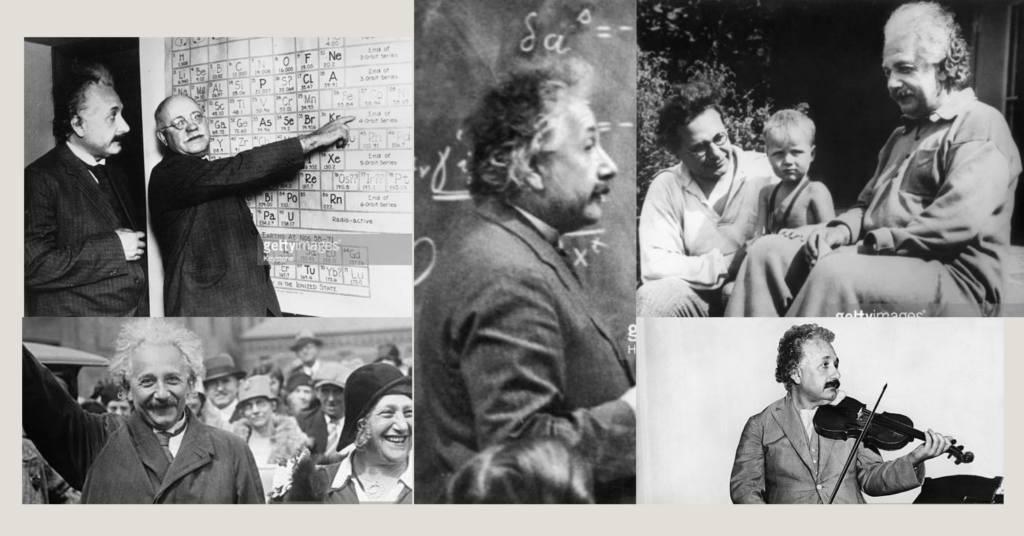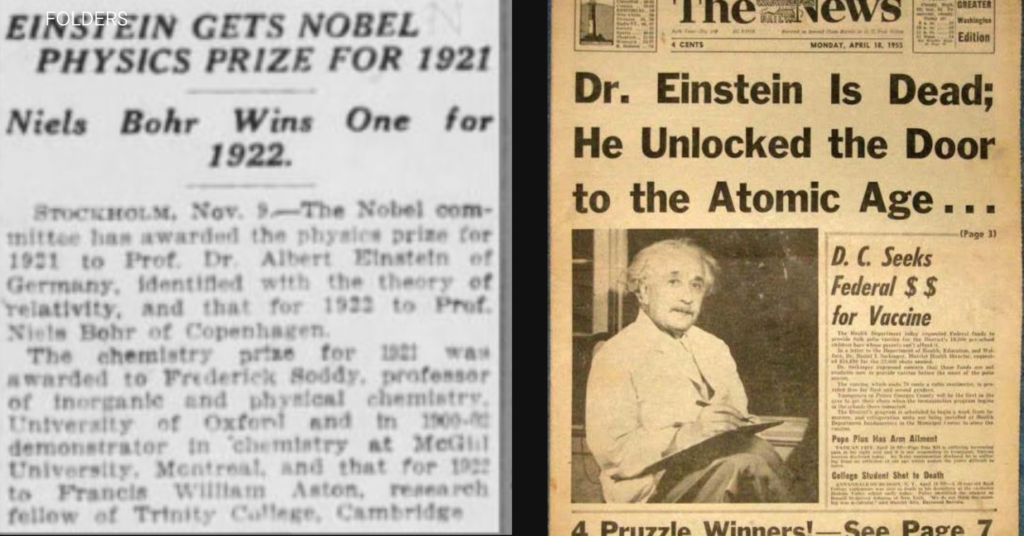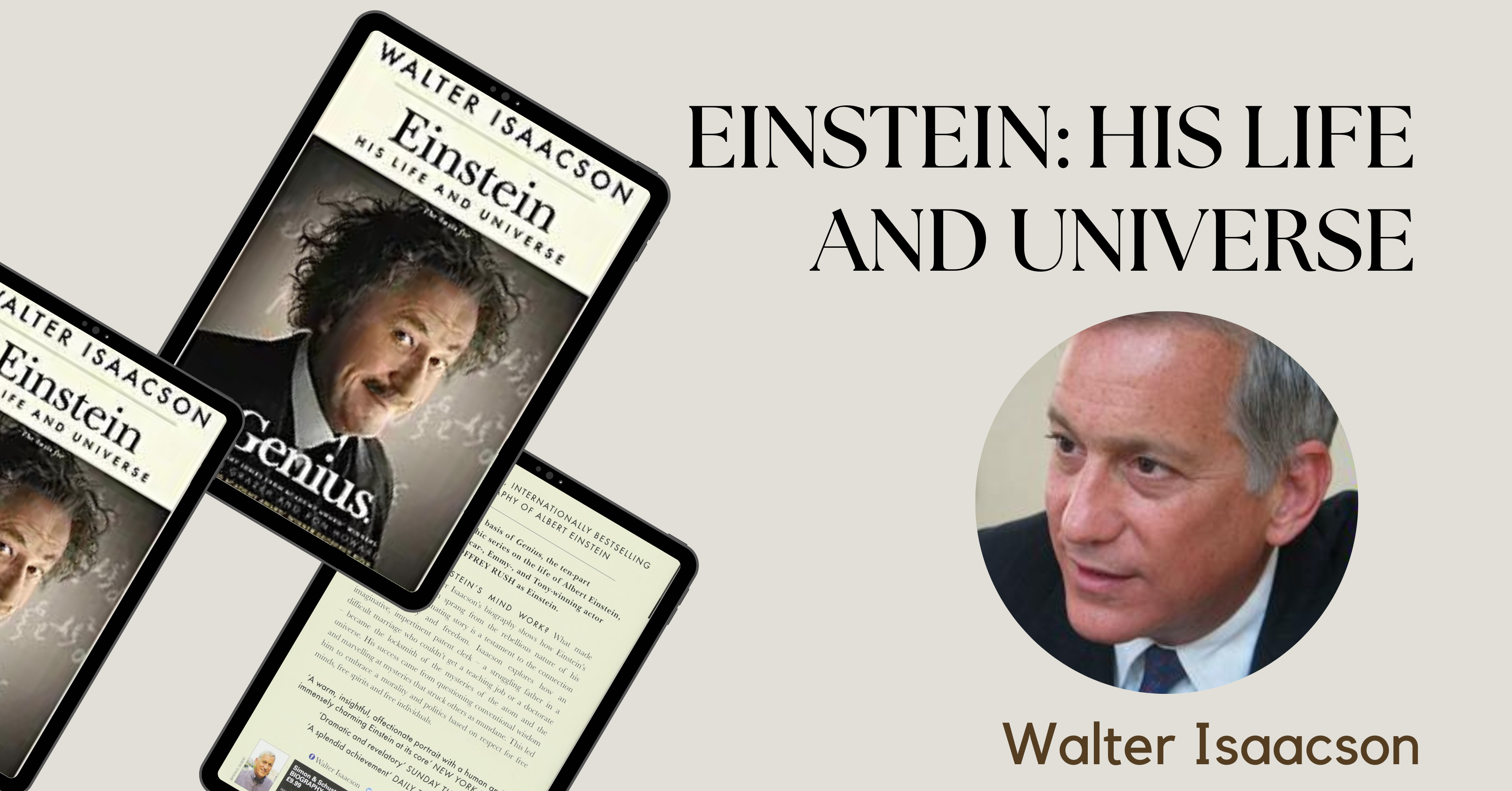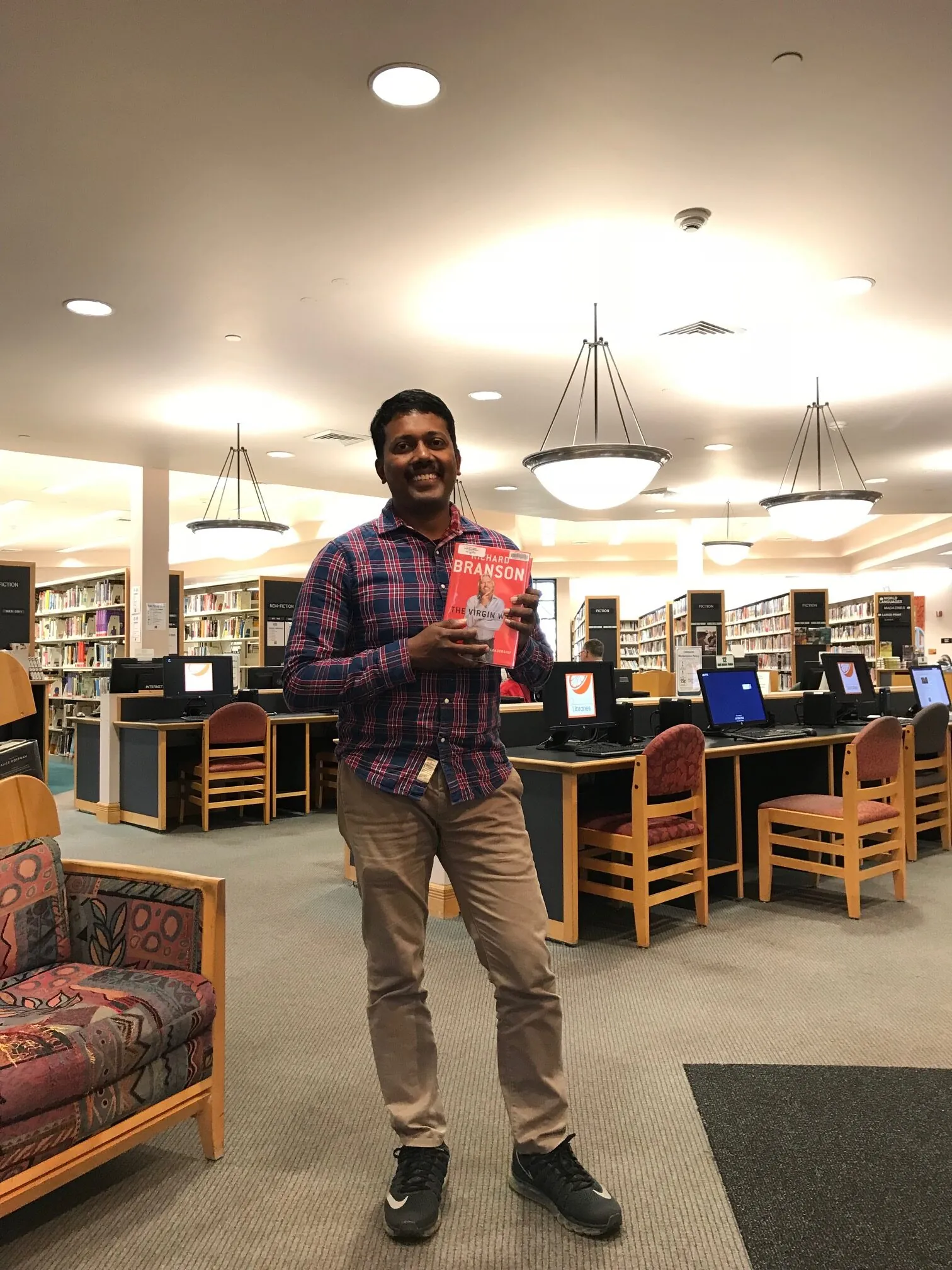Einstein, His Life and Universe – Walter Isaacson
Having read Walter Isaacson’s book on Steve Jobs and the Innovators, I decided to read his book on Einstein (His Life and Universe). Here are some of my learnings and notes from the book:
Albert Einstein was born on March 14′ 1879 at 11:30 am to Hermann Einstein and Pauline Einstein. He always questioned conventional wisdom and challenged authority. He gave up his German Citizenship (January 1896) and considered himself a citizen of the world. One of his biggest abilities was to imagine (visualize) how things worked. In Spite of being rebellious, he was able to empathize with those around him. Before he was fifteen years old, he mastered differential and integral calculus. Having read a lot of scientific books, he did not believe in religion and did not think the stories in the bible were true. Suspicion against every kind of authority grew and an attitude that never left him. Here is one of Einstein’s famous quotes: ‘A Foolish Faith in Authority is the worst enemy of truth. He was allergic to German Militarism and nationalism.
Zurich Polytechnic (1896 to 1900): One of Einstein’s professors Heinrich Weber, told him, ‘An extremely clever boy, but you have one great fault. You will never let yourself be said anything. According to Einstein, this was not a great fault to have (questioning conventional wisdom) and one of the primary reasons for his success. Einstein was forgetful, absent-minded, and had a distracted demeanor. In one of the places Einstein stayed, he forgot his keys. The host said to his parents that Einstein would amount to nothing in life. Einstein also met with Mileva Maric, who he later married. His parents did not like it. He also had a girl child with her, who later died. Mileva also gave birth to Hans Albert Einstein and Eduard Einstein.
Searching for a Job: Because he was always questioning authority and did not have a great rapport with his professors, it was not easy for Einstein to find someone to hire him. One of the great scientists Einstein wrote to was Wilhelm Ostwald. His father also wrote a letter to Ostwald, and it elicited no response. He finally landed a job at The Swiss Patent Office (a low-level job as a clerk). His job was to examine patent applications, and he worked six days a week starting at 8 am. Einstein, along with his friends Conrad Habicht and Maurice Solovine, founded the Olympia Academy in 1902 to discuss philosophy and physics. Nine years later, Ostwald was the first person to nominate Einstein for the Nobel prize.
Science: Light comes not just in waves but in tiny packets. The most revolutionary sentence that Einstein ever may have ever written was that light is made up of discrete particles or packets of energy. In the 1920’s photons became a fundamental part of physics.
Relativity: A good comparison between Jules Henri Poincaré, Einstein’s contemporary physicist, and Einstein is talked about in the book. The stark difference between the two is that – When Poincare looked for a new theory of electromagnetism, he tried to preserve as much of the old. However, Einstein, because of his nature to question conventional wisdom and authority, saw the old theory as cumbersome and unnecessary and wanted to get rid of it.
Einstein also came up with the mass of a body as the measure of its energy content. If a body emits Energy L in the form of radiation, its mass decreases by V² (V represents the velocity of light). L=MV², L got replaced by E (for energy) and V by C. E=MC²
All this happened when Einstein was still working at the Patent office. He soon started exchanging letters with eminent scientists and professors. In 1908 Einstein spoke on the theory of heat, and it only attracted three attendees.
Einstein was not too interested in political parties. The loyalty he felt was surrendering some independence and thought. One of the great qualities of Einstein was his ability to compartmentalize. Even the loudest baby crying didn’t seem to disturb his father, said Hans Albert, Einstein’s son. Einstein could tune out of all the distractions. This detachment helped him to walk through life immersed in thought.
In the Solvay conference, Einstein also met with Marie Curie. She had a relationship with Langevin. Marie Curie won a Noble prize for discovering Radium and Polonium. However, a member of the Swedish Academy wrote to her not to appear to receive the prize because of her illicit relationship. However, Marie Curie headed to Stockholm to receive the prize, saying that there was no connection between her scientific work and personal life.
Einstein and Hilbert were good friends and also competitors in a way. Einstein visited Gottingen and stayed at Hilbert’s home. Hilbert gladly gave credit to Einstein on his inventions on Relativity.
Relationships: The relationship between Einstein and his wife, Mileva Marić, and also later Elsa Einstein (who was also his cousin) is extensively discussed in the book. Einstein was flirting with Elsa while he was still married to Mileva. However, he was still close to his kids Hans Albert Einstein & Eduard “Tete” Einstein.

Fame & Zionism: Einstein was friendly to cameras, and he seemed to like it. If one does not genuinely want publicity, one doesn’t get it. However, Einstein did like it. He also started believing more in Zionism / Zionists (a person who believes in the development and protection of a Jewish nation in what is now Israel). Einstein also became an advocate for the creation of a new Jewish University in Palestine (which eventually became the Hebrew University in Jerusalem). Einstein travelled with the President of the World Zionist Organization – Chaim Weizmann, to raise funds for the University. Einstein associated himself more with Jewish people towards the end of his life. During his US Trip, Einstein also met with the then US President Warren G Harding. While in the US, a reporter asked him a question from the Edison Test (Thomas Edison did not like the US college education, and he disparaged it as too theoretical). He came up with a list of 150 factual questions. One of the questions was ‘What is the speed of Sound? – Einstein admitted that he does not carry such information in his mind as it is readily available in books.
Nobel Prize: Einstein won the Nobel prize for Physics in 1921 for his invention of the Photoelectric Effect and not for Relativity. Just like today, there were a lot of people opposed to his Nobel prize, and the contention was his theory of Relativity was not provable. Einstein was traveling to Japan when the prize was announced. Einstein should have won the Nobel prize a lot earlier. His not receiving the prize reflected more negatively on the Nobel than on Einstein, said French Physicist Marcel Brillouin. He also collaborated with Neils Bohr (his model of the atom was built on the laws that explained the photoelectric effect). Einstein thus won the Nobel not for his work in Relativity or gravity but for photoelectric effect (and he won it only once). Neils Bohr was younger than Einstein, and he had great interactions with him. Einstein’s collaboration with an Indian Scientist Satyendra Nath Bose is also discussed in the book (Bose Einstein Statistics). Once Einstein turned 40, he became an authority himself and was not quite as successful as he was in his early years. (Anything truly novel is invented only during one’s youth was what Einstein said – which of course, is not true). Some excerpts from the book. ‘Einstein’s scientific success had come in part from his rebelliousness. There was a link between his creativity and his willingness to defy authority. His stubbornness had worked to his advantage. ‘
Turning Fifty: Einstein had fallen in love with his secretary Betty Neumann. He also had relationships with Toni Mendel, a wealthy widow, Ethel Michanowski. Helen Dukas came to work as Einstein’s secretary in the year 1928. Until Einstein died in the year 1955 and until Helen’s own death in 1982, the never-married Helen was fiercely protective of Einstein’s time, privacy, and legacy. Hans Albert, Einstein’s son, had fallen in love with Frieda Knecht (nine years older than Hans) and married Frieda. Einstein was not happy about this. Hans was stubborn, just like his father. His other son Eduard fell into depression, and Einstein was increasingly worried about him. Einstein famously wrote – Life is like riding a bicycle. To keep your balance, you must keep moving. Einstein also met with John D Rockefeller Jr. The purpose of the meeting was to discuss the restrictions the Rockefeller foundation was putting on research grants. Einstein toured Universal Studios and also met with Charlie Chaplin. Chaplin famously said – They cheer me because they all understand me, and they cheer you because no one understands you. Einstein hated all dictatorships.
In the 1930s Einstein decided to return to America. He also had trouble returning/getting Visa to the United States(not any different today). However, it was all resolved. One feels the insignificance of the individual’, ‘and it makes one happy,’ Albert Einstein wrote when he witnessed a ferocious storm far greater than any he had ever witnessed. On January 30′ 1933, when Einstein was safely in Pasadena, Adolf Hitler took power as the new Chancellor of Germany. His apartment in Germany was also ransacked. In April 1933, the German Government passed a law declaring that Jews (defined as anyone with a Jewish Grandparent could not hold any official positions at any Universities in Germany. People were forced to flee Germany, and among them were fourteen Nobel Laureates and twenty-six of the sixty professors of theoretical physics in the country. How laws, culture, and policies can affect a country for the better or worse is interesting to note here. It also applies to business.
Einstein could also change his attitude when confronted with new evidence. He changed his views on Pacifism with the ascension of Hitler in 1933. For a scientist altering your doctrines when the facts change is not a sign of weakness.
In April 1934, Einstein announced that he was taking a full-time role at Princeton University. He did not live anywhere else for the remaining 21 years of his life. 112 Mercer Street became his address. Mahatma Gandhi also became a hero of Einstein, and he had a picture of him in his house. Elsa, Einstein’s wife, died on December 20′ 1936, at his house. Einstein’s sister Maja moved in with him. Einstein was able to find solace in his work to focus away from his personal troubles. Einstein wrote the Evolution of Physics with Leopold Infeld.
Enrico Fermi and Leo Szilard are best known for architecting the Atomic Bomb. Albert Einstein wrote a letter about Fermi and Szilard’s work to the then-President Franklin D. Roosevelt.
On Monday, April 18′ 2955, Einstein died at age 76. The autopsy on Einstein was conducted by a pathologist at Princeton Hospital, Thomas Harvey. However, he decided to embalm Einstein’s brain and keep it. The word spread. The idea was to do research on his brain. This also created a lot of news. At age 86, Thomas Harvey dropped off Einstein’s brain at the Princeton University.

Einstein summed up towards the end of his life.
I have no special talents, I am only passionately curious.
It interesting that Einstein wrote a lot of letters. Thankfully a lot of it has been preserved, which has also made it possible for Walter Isaacson and other authors to research and write on Einstein. I will also gladly admit that I was not able to understand everything pertaining to Science in the book. It is not on the author’s fault, however, my expertise. I did some extra research to follow. Thanks, Walter for this awesome book.




Leave a Reply